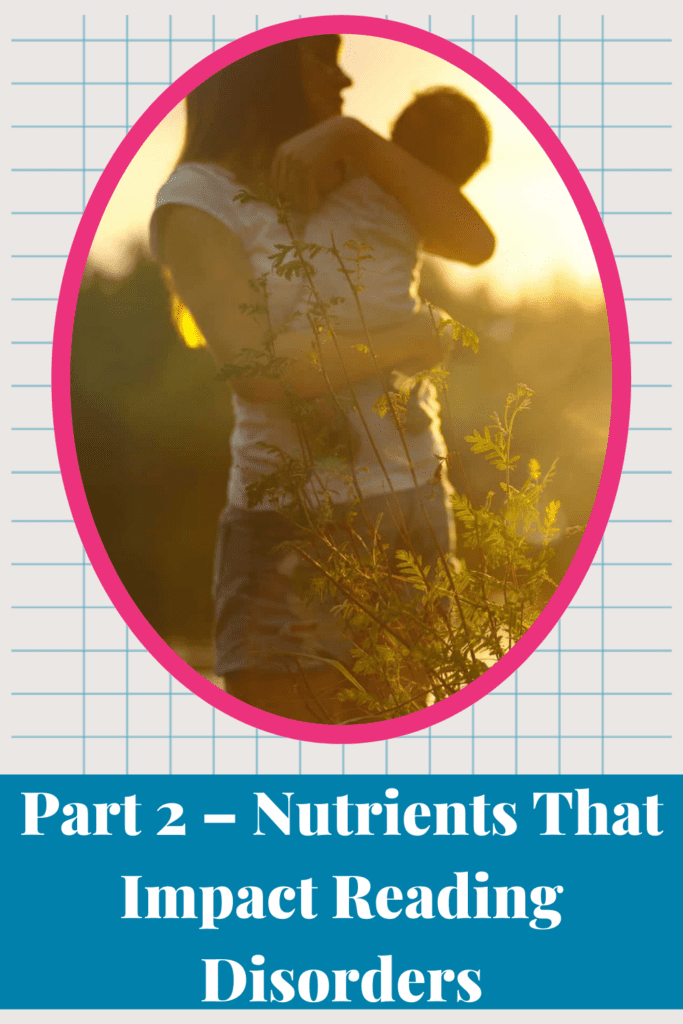I wish I could tell you that it’s as simple as adding these three supplements and you have it covered- but it’s not.
On the flip side – addressing dyslexia with nutrition is not the rocket science some people have made it out to be.
It’s about nourishment. Every now and then a parent contacts me asking what supplement I would recommend for dyslexia or ADHD.
In over a decade working as a nutritionist I have never seen one or even two supplements be ‘the fix’.
Addressing the root cause of learning and behavior difficulties is not a quick fix. There is no magic supplement any more than there is a magic pill.
Nourished Brains = Better Learning & Reading
What we do know is nourished brains means brains that are better able to learn and read.
Starting to add in nourishing foods will naturally crowd out the foods that are filled with anti-nutrients.
Adding in foods that are dense in the nutrients that I mentioned in my last article and the ones listed below is where I advise starting.
Nutrients to Gut Bugs
The research does show us that children with dyslexia and reading disorders, do have a tendency towards deficiency in certain nutrients that are critical for processes related to learning and reading.
There are three more nutrients that are often studied in connection to dyslexia as well as one ‘supplement’ that is not so much a nutrient but probiotics.
1)Vitamin D3
In recent years vitamin D deficiency has been linked to dyslexia, ASD and ADHD. Ensuring your child is getting sufficient sunlight is critical. If you live in the northern hemisphere, supplementing with vitamin D3 is highly advised during the winter months.
2) Iron
This mineral is essential to processing, reasoning, focus and memory. Decades ago research made the connection between lower math scores among girl after they start menstruating if their iron levels drop.
Further research revealed that iron deficiency related to either B12 or iron itself can impact not only reading but overall learning as well.
Knowing the Difference Between Heme and Non-Heme Iron
It’s important to know the difference between heme and non-heme iron. Heme iron comes from animals and non-heme comes from plants. Non-heme is harder for humans to absorb and requires high levels of vitamin C for absorption. It is important to be vigilant of this if your child is following a vegetarian diet.
Recognising that your child may have a genetic predisposition in being unable to absorb non-heme iron even with vitamin C is something to consider if you suspect iron or B12 deficiency.
The effect of genetics on diet types and nutrient absorption became apparent when I learned my own daughter is genetically unable to convert beta-carotene into vitamin A and therefore requires animal meat to get vitamin A. Both my daughter and I also have a predisposition to poor iron and B12 absorption.
This is why one person can thrive on a certain diet and another won’t.
3) Magnesium
This is a mineral in which approximately 90% of the population is deficient. This is because most of us are not consuming mineralized well water and because of mineral depletion in soil. The importance of magnesium cannot be stated enough. It is responsible for over 300 biochemical functions in the body and brain. Magnesium deficiency affects nerve transmission and results in decreased neuromuscular control and focus all of which can be a factor in dyslexia and reading disorders.
Magnesium glycinate or magnesium citrate are usually the best options. However, some children will do better with magnesium glycinate especially if they have problems with diarrhea or loose stools.
4) Probiotics
Your gut lining has over 100 billion neurons (think brain cells). The bacteria in your child’s gut not only manufactures certain vitamins and even neurotransmitters like serotonin and dopamine, it also contains most of your child’s genetic coding. Ensuring your child’s gut is packed with healthy bacteria is key to better brain function.
To avoid over-supplementing, your child can get plenty of good bacteria from fermented foods like sauerkraut and kimchi. Fermented foods are the ‘original’ probiotics.
Always remember you can’t out supplement a bad diet, but some supplements can help improve certain disorders.
Check out my program, Reading Rockstar Bootcamp to learn more about how I turn struggling readers into star students by combining nutrient therapy with reading therapy. My programs offer one-on-one learning therapies that targets the underlying reason why learning, writing and reading is so hard for your child. Think of me as a personal trainer for your child’s brain.
If you’re not sure if these programs are right for you, set up a free 20-minute discovery session to learn more about how you can help your child improve their visual processing so they can become a fluent reader and a more confident kid.
Sources:
https://www.jfhc.co.uk/study-links-winter-conceptions-and-vitamin-d-deficiency-with-a-greater-risk-of-autism-and-dyslexia
https://www.thelancet.com/journals/lancet/article/PIIS0140-6736(04)16671-3/fulltext
https://www.webmd.com/children/news/20010620/iron-deficiency-can-hamper-kids-learning-performance#1
https://www.ncbi.nlm.nih.gov/pmc/articles/PMC5361510/
https://www.ncbi.nlm.nih.gov/pmc/articles/PMC4569108/
https://www.ncbi.nlm.nih.gov/pubmed/15867048
https://www.ncbi.nlm.nih.gov/pubmed/16777670
https://link.springer.com/article/10.1007/s40474-014-0030-6
https://www.ncbi.nlm.nih.gov/pubmed/18158838
http://citeseerx.ist.psu.edu/viewdoc/download?doi=10.1.1.907.6355&rep=rep1&type=pdf
http://www.altmedrev.com/archive/publications/12/3/207.pdf
https://www.fabresearch.org/viewItem.php?id=6702
https://dyslexic.org.uk/research/genetics-dyslexia
https://www.thelancet.com/journals/lancet/article/PIIS0140-6736(04)16671-3/fulltext
https://www.bmj.com/content/349/bmj.g5160/rr/762973
https://www.ncbi.nlm.nih.gov/pmc/articles/PMC2545239/
http://www.jneuro.com/neurology-neuroscience/association-of-genetic-markers-contributing-to-dyslexia-susceptibility-in-indian-population.php?aid=9822
